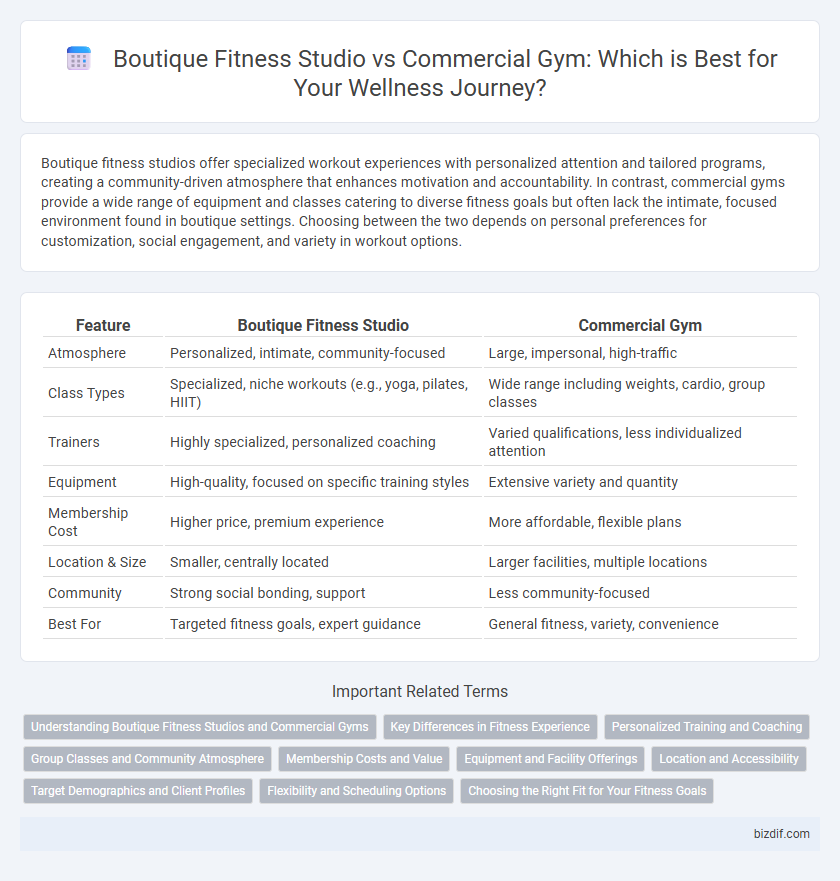Boutique fitness studios offer specialized workout experiences with personalized attention and tailored programs, creating a community-driven atmosphere that enhances motivation and accountability. In contrast, commercial gyms provide a wide range of equipment and classes catering to diverse fitness goals but often lack the intimate, focused environment found in boutique settings. Choosing between the two depends on personal preferences for customization, social engagement, and variety in workout options.
Table of Comparison
| Feature | Boutique Fitness Studio | Commercial Gym |
|---|---|---|
| Atmosphere | Personalized, intimate, community-focused | Large, impersonal, high-traffic |
| Class Types | Specialized, niche workouts (e.g., yoga, pilates, HIIT) | Wide range including weights, cardio, group classes |
| Trainers | Highly specialized, personalized coaching | Varied qualifications, less individualized attention |
| Equipment | High-quality, focused on specific training styles | Extensive variety and quantity |
| Membership Cost | Higher price, premium experience | More affordable, flexible plans |
| Location & Size | Smaller, centrally located | Larger facilities, multiple locations |
| Community | Strong social bonding, support | Less community-focused |
| Best For | Targeted fitness goals, expert guidance | General fitness, variety, convenience |
Understanding Boutique Fitness Studios and Commercial Gyms
Boutique fitness studios specialize in personalized training experiences, offering tailored classes such as yoga, pilates, or spinning in smaller, community-focused settings. Commercial gyms provide extensive facilities with a wide range of equipment and group classes, catering to diverse fitness needs and typically supporting higher membership volumes. Understanding the distinction helps individuals select a fitness environment that aligns with their goals, whether seeking specialized guidance or broad access to varied workout options.
Key Differences in Fitness Experience
Boutique fitness studios offer personalized training with specialized classes and highly trained instructors, creating an intimate, community-driven atmosphere distinct from commercial gyms. Commercial gyms provide extensive equipment variety and 24/7 access, catering to a broad range of fitness levels but often lack the tailored coaching found in boutique settings. The key difference lies in the boutique studio's focus on specialized workouts and personal attention versus the commercial gym's scale and convenience.
Personalized Training and Coaching
Boutique fitness studios excel in providing personalized training and coaching tailored to individual goals, offering small class sizes and expert trainers who prioritize quality over quantity. Unlike commercial gyms, which cater to larger crowds with generic workout plans, boutique studios emphasize client-specific adjustments, fostering a supportive environment that enhances motivation and results. This targeted approach leads to higher engagement, faster progress, and a more customized fitness experience.
Group Classes and Community Atmosphere
Boutique fitness studios offer specialized group classes with personalized attention, creating a tight-knit community atmosphere that fosters motivation and accountability. Unlike commercial gyms with vast, impersonal spaces, boutique studios emphasize small group sizes and expert instructors, enhancing the quality of workouts and social connections. The focused environment of boutique studios cultivates a supportive network, encouraging consistent participation and stronger member engagement.
Membership Costs and Value
Boutique fitness studios typically charge higher membership fees than commercial gyms, reflecting their specialized classes, personalized training, and smaller class sizes that enhance individual attention. Commercial gyms offer more affordable membership plans with access to extensive equipment and facilities but often lack the tailored experience and community feel found in boutique studios. Members seeking value prioritize boutique studios for focused, high-quality workouts, while budget-conscious individuals may find commercial gyms more cost-effective for general fitness needs.
Equipment and Facility Offerings
Boutique fitness studios offer specialized equipment tailored for focused workouts such as TRX systems, kettlebells, and rowing machines, promoting a personalized exercise experience. Commercial gyms provide a broader range of equipment including heavy-duty weight machines, multiple cardio options, and expansive free weight areas to accommodate diverse fitness levels. Facilities in boutique studios often feature intimate, well-designed spaces fostering community, whereas commercial gyms emphasize large-scale infrastructure with amenities like swimming pools, basketball courts, and extensive locker rooms.
Location and Accessibility
Boutique fitness studios typically operate in prime urban locations, offering easy access to clients through proximity to residential neighborhoods or business districts. Commercial gyms are often situated in larger complexes or suburban areas, which may require longer travel times and less convenient parking options. The strategic placement of boutique studios emphasizes personalized convenience, enhancing member retention and satisfaction.
Target Demographics and Client Profiles
Boutique fitness studios primarily target niche demographics such as young professionals, fitness enthusiasts, and individuals seeking personalized workouts, often emphasizing specialized classes like yoga, pilates, or HIIT. Clients at boutique studios typically value community engagement, expert coaching, and tailored fitness experiences, contrasting with commercial gyms that cater to a broader audience including families, casual exercisers, and athletes by offering extensive amenities and diverse equipment. Boutique studios attract higher-income, brand-conscious individuals focused on quality and exclusivity, while commercial gyms serve a larger, price-sensitive demographic looking for variety and convenience.
Flexibility and Scheduling Options
Boutique fitness studios offer personalized class schedules tailored to individual preferences, providing greater flexibility compared to commercial gyms with fixed, large-group sessions. Members can choose from specialized workouts at various times, enhancing convenience for diverse lifestyles. This flexibility supports consistent attendance and goal achievement by accommodating busy or irregular schedules more effectively than traditional gym settings.
Choosing the Right Fit for Your Fitness Goals
Boutique fitness studios offer specialized classes and personalized attention tailored to specific workout styles, ideal for individuals seeking a focused and community-driven experience. Commercial gyms provide a wide variety of equipment and amenities, catering to diverse fitness goals and accommodating high member traffic. Selecting between a boutique studio and a commercial gym depends on preferences for personalized coaching, class variety, and the overall environment that best supports your fitness objectives.
Boutique Fitness Studio vs Commercial Gym Infographic

 bizdif.com
bizdif.com